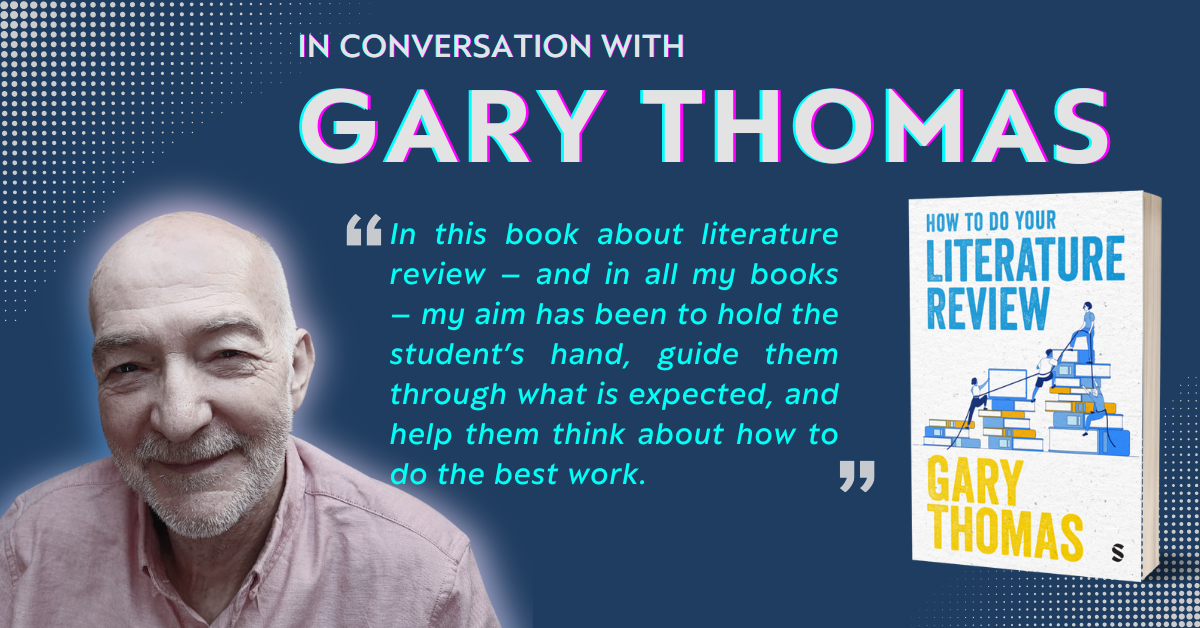
For many students and early-career researchers, writing a literature review can feel like navigating a maze, complex, overwhelming, and often misunderstood. But what if someone could walk you through it, step by step, with clarity and insight?
In this exclusive interview, we speak with Gary Thomas, emeritus professor of education at the University of Birmingham, whose latest book is a thoughtful guide designed to do exactly that. Drawing on decades of experience as a teacher, educational psychologist, and academic mentor, he shares why literature reviews so often go wrong and how to make them truly meaningful. From practical tips to navigating AI tools, and real-life examples to reshape your approach, his insights will change the way you think about this critical piece of academic writing.
Can you tell us about yourself and your background?
I’m an emeritus professor in education at the College of Social Sciences at the University of Birmingham. Many years ago, I was a primary school teacher, then an educational psychologist before moving to academic life. I’ve worked at five UK universities, four of them as a professor, where my interests have centred on the research methods used in the social sciences.
What inspired you to write this book, and how does it build on your earlier work in research methods?
I’ve lost count of the number of research projects I’ve supervised – UG, PG, and doctoral. Certainly many hundreds. In most of them, I’ve seen the same problems students face – problems to do with not knowing what is expected in doing something as complex as a research project or a literature review. Often, the student’s response is to plod through a process formulaically without thinking more deeply, critically, or creatively about the task. In this book about literature review – and in all my books – my aim has been to hold the student’s hand, guide them through what is expected, and help them think about how to do the best work.
Many students find the literature review daunting. Why do you think that is and how does your book aim to shift their perspective?
Some students certainly find the literature review daunting. More though, particularly where the review isn’t a freestanding one but is contributing to a research project, are perplexed by it and don’t really see the point. They may see it as a bit of a chore – a bolt-on. The result is that the literature review can be list-like, without significant analysis. And this is how it appears to the reader, namely, the marker of the work, with the result that it receives a mediocre mark. My aim has been to help students understand the point of a literature review and to help them understand how to structure it and give it integrity and purpose – and a good grade!
How does your book address the use of digital tools or AI in conducting literature reviews? Are they a help or a hindrance?
A significant part of the book is about using digital tools and AI – something that none of the existing books on literature reviews address. I look at a number of AI tools and show how to use them, pointing out their strengths and weaknesses. I point out the obvious strengths of these tools in brainstorming, searching, and summarizing, but caution against relying on the so-called generative aspects of them, which can accentuate the list-making tendency of the weaker literature review. AI literature review tools aren’t (yet) clever enough to say ‘However’ or ‘Nevertheless’ – they can’t spot gaps or identify controversies or methodological issues. In short, they can’t produce good reviews.
Your book includes a variety of case studies and real-life examples. What was your process for selecting these, and what did you hope they would illustrate to the reader?
I subscribe strongly to the mantra of ‘Show, don’t tell’ and I try to adhere to it. I narrate stories, both about my own experience and about that of other researchers. I hope that this engages readers, but more importantly, I think examples and case studies usually highlight the real-life issues that confront researchers. They show how real people have confronted those kinds of issues and surmounted them.
Finally, what’s the one piece of advice you’d give to students or novice researchers as they begin writing their literature review?
Think about what the review is for and try to structure it appropriately. I give a lot of advice on this in the book.
📺 Enjoyed the interview? Don’t miss Gary Thomas in action as he shares tips on doing your literature review and how AI tools can help on YouTube!
Find out more about *How to Do Your Literature Review by Gary Thomas*

In Conversation with Christopher Lamont and Mieczyslaw P. Boduszynski
In Conversation with Marc Baaij
In Conversation with Michael D Myers
In Conversation with Gjoko Muratovski
In Conversation with Emily Öhman
In Conversation with Christopher Such
In Conversation with Andrei Lux
In Conversation with David Deakins and Jonathan M. Scott
In Conversation with Michael Beverland and Pınar Cankurtaran
In Conversation with Annmarie Hanlon
In Conversation with S Alexander Haslam, Craig McGarty, Tegan Cruwys & Niklas K. Steffens
In Conversation with James Abdey









